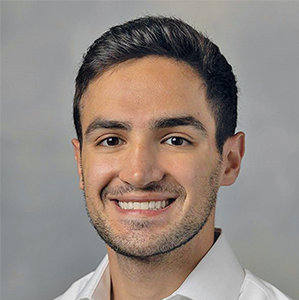
Autopilot: How artificial intelligence is changing medicine
Fall 2022
To many, artificial intelligence (AI) is the stuff of science fiction: autonomous machines, simulated realities, killer robots. Today, though, artificial intelligence is far from science fiction. In fact, many real-world applications now
in development will change how financial systems run, how businesses shape the consumer experience, and, perhaps most importantly, how doctors practice medicine.

Dr. Cyril Zakka (MD ’22), is one of the foremost pioneers in the field of artificial intelligence in medicine.
A graduate of AUB, Dr. Zakka’s fascination with the intricate codes that shape our world goes back to his adolescence. “I started playing around with coding when I was eight years old. There was an app that I wanted but couldn’t get because I was in Lebanon. So, I thought, why don’t I try making it?” This curiosity and ingenuity would lay the foundation for his life’s work.
As founder and program director of the Artificial Intelligence in Medicine (AIM) program at AUBMC, Dr. Zakka and his colleagues are putting their coding skills to work, building artificial intelligence systems that advance patient care. “Artificial intelligence in medicine will not replace medical professionals. It will augment their capabilities.” Dr. Zakka is developing AI algorithms to expand a surgeon’s capabilities to improve patient outcomes.
Imagine a cardiothoracic surgeon in an operating room, the theater lights above, the hums and chirps of medical equipment, and the nurses and technicians monitoring medical supplies as the surgeon repairs a heart valve. Such an operation is likely performed dozens of times a day in a hospital. Now imagine that in the background, an AI algorithm is imaging the patient’s blood flow to organs, scanning for damaged tissue, and tracking vitals. It would be an unseen medical professional performing immense calculations to support the surgeon during the operation. “Physicians have a lot of information from the human body that they need to sift through. AI can help direct and focus attention to reduce mistakes. It’s like autopilot for medicine,” Dr. Zakka explains. Just as a surgeon uses X-rays, sonograms, and lab results to create treatment plans, the AI system will be a tool to augment their perception of the patient.
AI has proven to be a significant driver of medical innovation worldwide, with clinical applications ranging from disease diagnosis to surgical planning. The large amounts of medical data generated by hospitals, and growing efficiencies in AI algorithms, make many clinical problems ripe for AI solutions. Through AIM, funded by the Hugging Face Foundation and the first program of its kind in the region, Dr. Zakka and his team are building tools and applications that employ recent advances in research from the lab directly to the patient’s bedside. “What’s important to think about with AI is that it is more than an innovative technological development. AI has the potential to save lives,” he says.